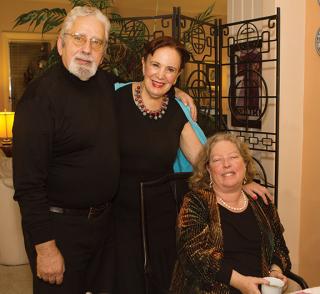“You’d be amazed how often I’ve heard Jews say: ‘I didn’t know there are Jews in Latin America,’” said Joseph Sectzer, a Mequon resident originally from Argentina.
Yet, many Jews call Central and South America and the Caribbean their home. More than 370,000 Jews live in Latin America, a conservative estimate reported by The Berman Institute’s “World Jewish Population, 2012”(JewishDataBank.org).
Sectzer chairs the Jewish Latin America Collection (JLAC) Associates, an organization of academic and community members formed around the Jewish Latin America Collection housed in Special Collections at the University of Wisconsin-Milwaukee Libraries.
“This lack of awareness should change dramatically as the local community becomes more familiar with the programs and works being sponsored by JLAC,” Sectzer said.
It started after Robert Meldman, a Milwaukee resident and former adjunct professor at the UWM School of Business, and his wife, Sandra, traveled annually with Sandra’s sister and her husband, Reena and Michael Hais, of Arcadia, Calif., to vacation in Puerto Vallarta, Mexico.
“As a result, we developed an interest in the rich, but relatively little known Jewish life and culture of Latin America,” said Michael Hais. The Meldman and Hais families wished to pursue this curiosity, not only with funding, but also with time and effort.
In 2007 they solicited help from Max Yela, head of Special Collections at the UWM Libraries, himself a Latino. Although not Jewish, Yela has always gravitated toward the Jewish community.
“This experience of being Jewish in the U.S. doesn’t always translate to Jewish experiences elsewhere in the Western Hemisphere,” said Yela. “In the U.S., we focus on the [U.S. and Canadian] experience, and that gives us a myopic view of the so-called ‘New World.’
“So to gain a better understanding of the diaspora experience beyond North America in the Western Hemisphere is the point of the collection, to offer documentary evidence of that experience.”
Renowned speakers
To carry out this goal, Meldman said, “The JLAC acquires published, primary-source materials by utilizing a variety of resources that range from newspapers and announcements to original community-generated accounts and to first and special editions of literary and artistic works.”
Yela added, “We’re the only special collections of Jewish Latin America. There are general collections in other libraries, but nowhere else is preserving them as artifacts, and we’re singular in that regard.”
While the materials offer rich evidence of Latin America’s Jewish communities, the JLAC also brings living examples to Milwaukee with lecturers from all over Latin America, including artists, writers, poets, storytellers, academicians and rabbis.
Ruth Behar, a Jewish Cuban American renowned as an anthropologist and writer and winner of the MacArthur Foundation “Genius” Award, spoke at UWM in 2011.
In October 2013, also sponsored by the Sam & Helen Stahl Center for Jewish Studies and the Department of Spanish and Portuguese, JLAC presented a symposium of Jewish Latin American Writers with speakers renowned in the literary world, including Marjorie Agosin, Stephen Sadow and Jose Kozer. (See Chai Lights photo in the November 2013 Chronicle.)
In an effort to “be in the community, and not just have the community come to us,” said Yela, Victor Mirelman, Argentine rabbi and scholar, presented in May 2014 at Congregation Emanu-El B’ne Jeshurun and at Jewish Museum Milwaukee on two complementary topics, the Sephardim and Crypto-Jews in relation to the Spanish Inquisition.
In 15th Century Spain, Jews were forced to convert to Christianity, be exiled or be put to death. Crypto-Jews are those who “converted or hid their Judaism and after many years are slowly discovering their Jewish roots,” said Yela.
For its next event this fall, the JLAC hopes to bring Ana Maria Shua, an Argentine writer, “known on both sides of the Atlantic, but not well known in the U.S.,” said Yela. The initiative is spearheaded by a literature professor at UWM’s Department of Spanish and Portuguese, Cesar Ferreira, a strong supporter of the JLAC.
To Argentina’s east is Chile, where active JLAC member Lilliana Rosenthal was raised. She now resides in Shorewood along with her husband, Joel.
Joel and Lilliana provide a home away from home for the guest lecturers with meals at their house, along with JLAC community members.
“The goal is to create the spirit of love for the subject matter by which these authors write about, with their love, energy, and their chemistry, which is so magnificent,” said Lilliana.
Joel, Lilliana’s husband, studied Jewish history extensively in college but knew almost nothing about Jewish Latin America before he met his wife.
“I think that I’m representative of the Jewish community in that I knew very little about this segment of the Jewish people, the realities of each community in Latin America, and the incredible contributions they’ve made to their respective countries and the world,” he said.
“And as the Spanish-speaking community in the U.S. becomes more important politically and culturally, the Jewish component of that will have more importance,” he said.
All those involved in the JLAC have visions for the future. One is of collaboration between the Nathan and Esther Pelz Holocaust Education Resource Center of the Milwaukee Jewish Federation and the Holocaust Museum of Buenos Aires, Argentina.
JLAC will continue to work with Jewish Museum Milwaukee. Molly Dubin, JMM curator, is a JLAC associate member.
There are also plans to diversify programming, such as K-12 outreach and workshops. The JLAC also wishes to increase its visibility in the Milwaukee community.
The JLAC is supported by the Louis P. and Ethel S. Setlick Fund, named in honor of the parents of Sandra Meldman and Reena Hais, with help from individual donors.
To get involved, contact Yela at 414-229-4345, maxyela@uwm.edu, or Sectzer at 414-899-1601, joesect@sbcglobal.net.
Joshua Becker is a Spanish teacher for Shorewood Public Schools and a freelance writer.



